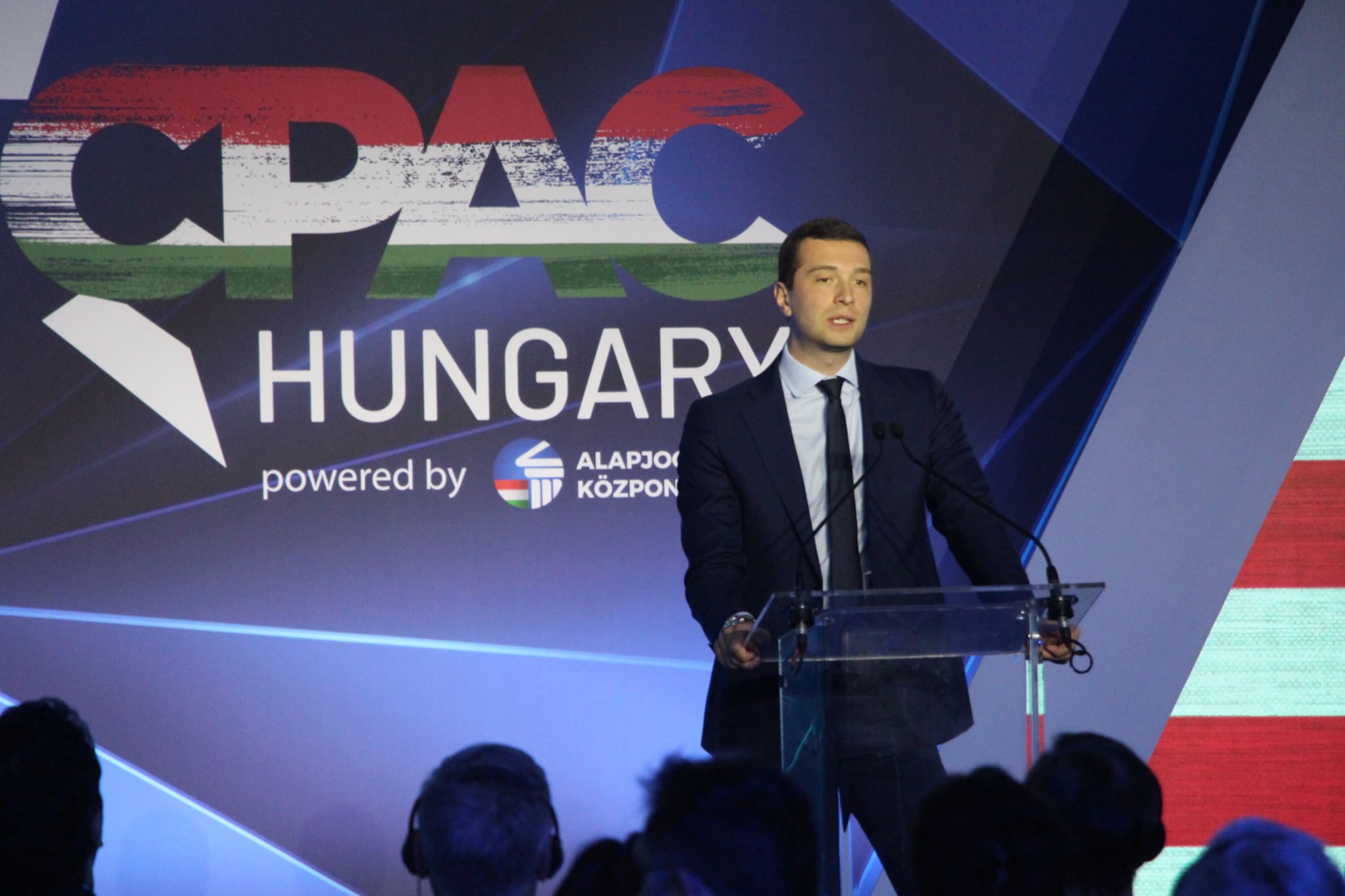Marine Le Pen’s National Rally at CPAC, an American event? You are often accused of being a pro-Russian and anti-American party, so could you explain your presence here?
I project and defend the interests of France. The interest of a summit like this one, which I am attending for the second consecutive year in Budapest, is to be able to meet, talk with, and engage with all the representatives of political parties, but also of the cultural, patriotic, sovereignist, conservative, and national movements from Europe and elsewhere in the world. It is an opportunity to meet and engage with each other. I believe that we are fighting the same battle and that, beyond our differences of opinion, we must be able to work, at least on our continent, on this Europe of Nations and cooperation between states, which we are calling for.
Does this mean that you define yourself as a conservative party?
I think that conservatism does not correspond well with the French. It is not a term that is used in the French public debate or by French intellectuals. However, we defend the aspiration to sovereignty, and I think that we appear today as the guardians of the limits in the face of a wild, unbridled, unlimited, ultra-liberal globalization, in the face of the loss of our identity due to demographics evolving with the successive waves of migration as well as to the questioning of the bases upon which our society was founded, the woke ideology and the cancel culture, which I wanted to discuss precisely at CPAC.
Wokeism is usually associated with Anglo-Saxon countries. Yet, you speak of it as a threat affecting France as well. What are the manifestations of this woke ideology in France?
It is in a way an Americanization of the threats weighing on us since wokeism, which draws its source from an Anglo-Saxon cultural movement, is being imported today with the support of the European Union, through the modification, for example, of our language, through the introduction of inclusive writing, through the promotion of the Islamic veil in EU institutions, through the suppression of our borders, through the will to destroy our statues and to stop teaching some parts of French history. The woke cancel culture can be seen very concretely in the daily life of the French, especially in our school books, and this is why I believe it is important to talk about it.
[pp id=75599]
I believe that politics is not only an electoral battle. It is also an intellectual and cultural struggle. And I believe, in accordance with Gramsci’s theses, that cultural struggles and the victories that result from them always precede electoral victories.
Can we say in this case that the National Rally is today the main political bulwark against wokeism in France?
I believe that it is not only the main bulwark against wokeism, but actually, the main movement that proudly assumes and claims the French identity, the belonging to a common civilization called Europe, and the necessity to preserve the existence of Europe’s nations when the European Union is trying to build itself in denial of those nations.
To build Europe without nations is to build Europe without Europe, and France, which precisely invented the nation, being one of the oldest nations in the world since its existence dates back to the baptism of Clovis around the year 500, is perhaps the best placed to fight this struggle in Europe.
Why is it that wokeism, which manifests itself in this pro-mass immigration and pro-LGBT rights ideology, and which also manifests itself, according to some, in a certain form of radical environmentalism, has dominated the EU institutions? Do you think this trend can be reversed?
This comes from an intellectual, cultural, elitist and political movement that has indeed dominated our institutions for almost 30 years and which has forged today this weapon of wokeism, which is, in reality, a weapon of deconstruction of our values, of our identity and of all the bases that protect citizens today, starting with the family. It is indeed an ideology that corrodes the EU institutions, and it is precisely at summits such as CPAC that we can see how many we are and how many allies and alliances we have throughout Europe and the world, and I believe that the time for the awakening of the peoples has come.
Being here in Hungary is all the more symbolic because Hungarians have elected a patriotic government that defends the interests of its people, that proudly assumes its identity, which it seeks to transmit faithfully. And to be here is also to be alongside people who have paved the way for this springtime of the peoples that we ourselves wish to bring about from within each of our countries.
But then, if France is governed by the National Rally, one can suppose it will suffer the same fate as Hungary and Poland, that is to say, suffer EU sanctions that will deprive it of EU funds?
There is one fundamental difference, however: The countries that actually set the course for the European Union are France and Germany.
If France has a patriotic government, which defends the interests of the peoples and the nations, not only in France but in all of the EU, I believe that this will not have the same impact as for another country. It is not an insult to other countries to say that France has a particular weight on the European scene and a particular voice in the world.
This is why I believe that going forward, France will have enough diplomatic weight to give impetus to this new direction that we want, which would reflect the will of the peoples of Europe.
And we are not alone, because actors expressing similar views are emerging all over the continent, from Italy to Austria, Flanders, Hungary, Poland and, I hope, in France as well. In past history, France has always set an example and made its revolution first. I think that the time of the patriots has come in France as well.
There is a current in France, well-known in Central Europe and particularly in Poland, which sees Russia as a potential bulwark against this American wokeism. The National Rally was said to be rather pro-Russian, which it denied. You personally condemned the aggression against Ukraine from the very beginning, as did your party. However, if there were no longer this war in Ukraine, wouldn’t you also see Russia as a potential bulwark against Western wokeism?
No, I don’t share this sort of Manichean view. I don’t think we have to choose between wokeism and Russia. On the contrary, I believe that Europe and France should have a particular voice, and I do not believe that Russia is a model. Of course, I condemned the aggression of Ukraine by Russia, because being a sovereignist in France and Europe means being a sovereignist everywhere. When one is committed to the territorial integrity of one nation, one should also be committed to the territorial integrity of all nations.
I am a supporter of peace. I hope that this conflict will lead as soon as possible to a dialogue between the different actors, and I think that France should take the initiative of an international conference for peace. We must, in any case, preserve Europe from the risk of escalation because, contrary to the supporters of woke ideology, we are very familiar with history, and in particular with the history of Europe, and we know that escalation can have irreversible consequences in Europe, perhaps more than elsewhere.
Concerning Europe’s need to reform and fight wokeism from within, you spoke in your speech at CPAC of your hope for a first-time victory for the conservative, anti-woke camp in the next elections to the European Parliament in 2024. There was already talk of a possible victory before the previous 2019 elections. What has changed that gives you more reasons for hope this time?
We have been witnessing an uninterrupted rise of all patriotic forces on the entire European continent. In June 2022, we ourselves succeeded in putting the supporters of woke ideology in the minority, preventing Emmanuel Macron from obtaining a majority in the French National Assembly, and we have the ambition to do the same in the European Parliament in 2024.
We have allies for this, with two powerful groups in the European Parliament, the European Conservatives and Reformists as well as Identity & Democracy.
These two groups are leading the fight for the defense of European identity and sovereignty within the European Parliament, and my ambition remains to bring these two groups together so that tomorrow there will be a single, strong, powerful coalition that can, within the European Parliament itself, make the voice of the peoples heard and accompany the current and future patriotic governments in EU member states, starting with the one formed by Ms. Meloni and Mr. Salvini in Italy, and I hope from 2027 the one led by the National Rally in France.
Indeed, we can see an alliance of the right forming internationally, at least at the European level, and even in the wider West at CPAC. Is a union of the right in France itself also possible, for example, following the Italian model?
France has a very particular voting system. It is perhaps an exception in Europe since it does not have proportional representation at all in its parliament. In other countries, if you want to govern, you have to pool forces and discuss coalitions.
This is not the case in France where the supreme election is the encounter of a man or a woman with the French people.
During the last presidential election, I regret that Éric Zemmour presented his candidacy at the risk of weakening the national camp’s candidate who was by definition the best placed because it meant taking the risk of having far-left Jean-Luc Mélenchon qualify for the second round.
If the attempts to unite the right end in a second round between Jean-Luc Mélenchon and Emmanuel Macron, then those who promote it should, I believe, question themselves.
In any case, I believe in pooling electorates, and I want the National Rally to be this platform, gathering around it all the lovers of France, wherever they come from and whatever their past choices were.






